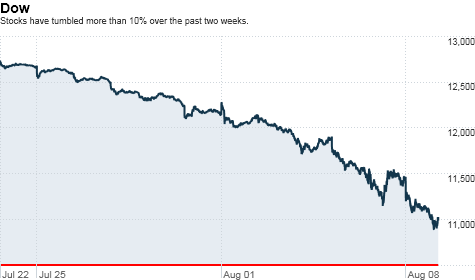Search News

NEW YORK (CNNMoney) -- With no end in sight to the stock market's downward turn, investment advisors have cautioned panicked clients to remain calm. But, for some investors, the sell-off in the market has dealt a devastating blow.
Big fund shops, including T. Rowe Price, Vanguard and TIAA-CREF, received a wave of calls from investors seeking guidance about what to do as the Dow posted its biggest decline since the financial crisis of 2008 late last week. Standard & Poor's downgrade of the United States' credit rating hasn't helped soothe investor jitters either, with another 4% sell-off Monday.
"We aren't advising people to run for the hills," said John Woerth, a Vanguard spokesman. "This is part and parcel for the stock market, and investors who have been invested in the market for a long time have seen volatility like this before, so they're willing to stay the course."
That's all well and good for long-term investors, who have time to wait out this most recent tumble. But for people who are on the brink of retirement, or about to send their kids to college using their investments, the fact that the market has now lost all of its gains for the year is a lot more disconcerting.
"For the average working family, [the stock market decline] does create problems if they have short-term goals like saving for college -- that's going to be where they see the biggest hit," said Charles Rotblut, vice president of the American Association of Independent Investors (AAII). "Some older people who are about to retire will be in trouble too, and see their retirement income hurt from this."
The AAII said bearish sentiment among its 150,000 members surged 18 percentage points to 49.9% last week -- the biggest one-week jump since July 2006. (And that sentiment reading was taken before the market tanked.)
By late Monday, the stock market had shed 14% over the past two weeks.
That means someone planning on retiring next month who has an IRA with a balance of $200,000, with 80% in stocks, just watched more than $22,400, or 14%, of that money slip away in less than a month. And while it may seem unlikely that someone right about to retire would have 80% of their money invested in stocks, Stuart Ritter, a vice president and certified financial planner at T. Rowe Price, said that many do.
Vanguard reported that investors over the age of 65 had an average of 49% of their retirement money invested in equities in 2010.
As the stock market looked like it was turning a corner last year, many investors went heavy on stocks hoping to regain some of what they lost before they retired.
But for soon-to-be retirees and parents of college-bound children whose portfolios are highly allocated in stocks, the stock market's recent plunge should be a wake-up call to start making some changes.
"If you have money invested that you really need within the next couple of years, it should be invested pretty conservatively in things like short-term bonds, money markets or CDs," said Rotblut. "If you haven't done the proper allocation until now and you need that money soon, you can't afford to take any risk, so your primary goal should be to preserve whatever money you still have."
Rotblut recommends that investors expecting to retire in the near future follow the rule of thumb of having a stock allocation equal to 100 minus their age. So if you're 60 years old, your stock allocation would be 40%.
Anyone who is about to send a child to college next year using the money in a 529 fund or other investment should have no more than 20% of their money invested in the stock market, said Stuart Ritter, vice president and certified financial planner at T. Rowe Price.
This story has been updated from an earlier version that ran on August 4. The latest version includes updated market data, charts and other information. ![]()

Carlos Rodriguez is trying to rid himself of $15,000 in credit card debt, while paying his mortgage and saving for his son's college education.
| Overnight Avg Rate | Latest | Change | Last Week |
|---|---|---|---|
| 30 yr fixed | 3.80% | 3.88% | |
| 15 yr fixed | 3.20% | 3.23% | |
| 5/1 ARM | 3.84% | 3.88% | |
| 30 yr refi | 3.82% | 3.93% | |
| 15 yr refi | 3.20% | 3.23% |
Today's featured rates: